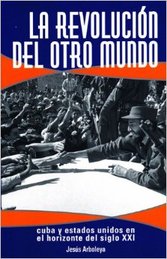The government of Ramón Grau San Martín lasted from September 10, 1933 to January 15, 1934. Although short-lived and characterized by internal contradictions, the government of “100 days” was an important moment in the neocolonial republic, because it was independent of the United States, and it enacted a series of progressive reforms that had potential implications for the breaking of the neocolonial relation.
There were three factions in the Grau government, in contradiction and conflict with one another. The rightist faction was led by Fulgencio Batista (see “The rise of Batista” 8/8/2014), who refused to enter the cabinet but controlled the armed forces. Batista supported the interests of US imperialism and the Cuban oligarchy, and during the Grau government, he was in constant communication with the US ambassador (Instituto de Cuba 1998:306-7).
The nationalist-reformist faction was led by Grau and leaders of the University Student Directorate. It advocated the convoking of a Constitutional Assembly; the capitalist economic development of the country; laws for the protection of the rights of workers and the people; the eradication of racial and gender discrimination; the expansion of educational opportunity and of access to culture; the distribution of land to peasants and agricultural workers, but in a form that was consistent with the interests of the Cuban estate bourgeoisie; and the protection of Cuban political sovereignty, without undermining the alliance between the United States and Cuba; and it had an anti-communist ideology (Instituto de Cuba 1998:307). Like Machado in 1924, the nationalist-reformist faction sought to reform the neocolonial system by making concessions to popular demands and at the same time protecting the interests of the US corporations and banks and the Cuban national bourgeoisie. As we have seen, a reformist program is not sustainable in the long run (“Machado and the promise of reform” 7/16/2014).
The revolutionary faction of the Grau government was led by Antonio Guiteras, who held the important cabinet post Secretary of Government and War. As we have seen, Guiteras had led the armed struggle in the eastern and central provinces against the Machado regime (see “Guiteras and the Revolutionary Union” 8/6/2014). Guiteras sought to establish a government “where the interests of workers and peasants are above the profit desires of national and foreign capitalists” (quoted in Instituto de Cuba 1998:308). He advocated the economic independence of Cuba with respect to the United States, the gradual nationalization of public services, the immediate distribution of land to peasants and agricultural workers, and social and employment equality for women (Instituto de Cuba 1998:307-9).
The Grau government enacted a number of legislative reforms, proposed by Guiteras and made possible through tactical alliance between the revolutionary and reformist factions. Measures were taken with the intention of removing the participants in the Machado government from the political scene: the dissolution of the political parties; the designation of governors and mayors in the provinces; and the establishment of tribunals to sanction those who had been responsible for crimes committed by the Machado regime. With respect to economic policy, the orientation of the Grau government was toward greater intervention in the economy. The economic measures included the regulation of the sugar industry, with regulations favorable to small producers; suspension of the payment of the debt contracted by the Machado government with the Chase National Bank; and the reduction of electricity rates. With respect to labor, the government recognized the rights of workers to form unions and to strike; it established a minimum wage; and it limited the working day to eight hours. In foreign affairs, the government adopted an anti-imperialist posture, calling for the abrogation of the Platt Amendment (see “The ‘democratic’ constitution of 1901” 6/30/2014) and rejecting US interference in the affairs of Latin American nations (Instituto de Cuba 1998:309-10; Vitier 2006:141-43).
At the same time, troops under the command of Batista engaged in a ferocious repression of striking workers and the Communist Party of Cuba. This policy was made possible through a tactical alliance between the right and reformist factions, and it was the source of significant conflict between the rightist and revolutionary factions within the government (Instituto de Cuba 1998:311-13, 316).
Taken on balance, however, the government of “100 days” was an independent and progressive government. Citio Vitier writes that the government “emitted an impressive series of truly revolutionary laws and decrees.” He describes it as “an audacious anti-imperialist offensive, the first realized in Cuba from power.” With reference to Guiteras, he writes, “As incredible as it seems, Cuba was governing itself in the person of that pale, serious, direct and unyielding youth of twenty-six years of age” (Vitier 2006:141-42; italics in original). Because of its progressive character, the Grau government was under constant attack by the Cuban estate bourgeoisie, the associations of Cuban and foreign capitalists, the societies with roots in Spanish colonialism, the ex-officials of the armed forces, the reformist opposition to Machado, the fascist ABC, and the reactionary press (Instituto de Cuba 1998:314).
The US administration of Franklin Delano Roosevelt did not recognize the Grau government. On the day of the September 4 coup, Batista began to meet with Benjamin Sumner Welles. The US ambassador was impressed immediately, and he soon came to view Batista as the best hope for an order consistent with US interests. By the end of October, Wells and Batista had arrived at a plan to replace Grau with Coronel Carlos Mendieta as president, with Batista as head of the armed forces. Guiteras tried to use Batista’s collusion with a foreign power as grounds for his removal as head of the armed forces, but Grau rejected Guiteras’ proposal for the dismissal of Batista. At the same time, there was resistance to the Batista-Wells plan by the Cuban elite, as a result of the fact that Batista was a mulatto of humble origins. And the Batista-Wells plan was complicated by the indecision of Mendieta. But as the Grau government came to be increasingly influenced by the revolutionary faction, Wells and his successor, Jefferson Caffery, continued to lobby for the replacement of Grau. Under pressure from Batista, Grau submitted his resignation on January 15, 1934. Mendieta was installed as president on January 18, and the Mendieta government was recognized by the United States on January 23. Thus emerged a government that was “delivered by Caffery, directed by Batista, and represented by Mendieta” (Instituto de Cuba 1998:304, 313, 316-18).
With the coup d’état of January 15, 1934, Guiteras went underground, with the intention of organizing an armed revolutionary struggle against the Caffery-Batista-Mendieta government (Instituto de Cuba 1998: 318). Antonio Guiteras was assassinated by Batista’s soldiers on May 8, as he was seeking to clandestinely leave the country. Killed with him was the Venezuelan Carlos Aponte, who had been a coronel in the army of Sandino in Nicaragua (Vitier 2006:143).
Ramón Grau San Martín went into exile in Mexico on January 20, 1934. Upon his arrival, he was acclaimed by a great multitude, which believed that he was the principal force behind the progressive laws that Guiteras had championed (Instituto de Cuba 1998:319). Grau would later return to Cuba, and he would be elected president in 1944, promising reforms. Whereas Machado had promised reform and had delivered repression, Grau would promise reform and would deliver corruption.
References
Instituto de Historia de Cuba. 1998. La neocolonia. La Habana: Editora Política.
Vitier, Cintio. 2006. Ese Sol del Mundo Moral. La Habana: Editorial Félix Varela.
Key words: Third World, revolution, colonialism, neocolonialism, imperialism, democracy, national liberation, sovereignty, self-determination, socialism, Marxism, Leninism, Cuba, Latin America, world-system, world-economy, development, underdevelopment, colonial, neocolonial, blog Third World perspective, Cuban Revolution, neocolonial republic, Guiteras, Grau, Batista






 RSS Feed
RSS Feed





